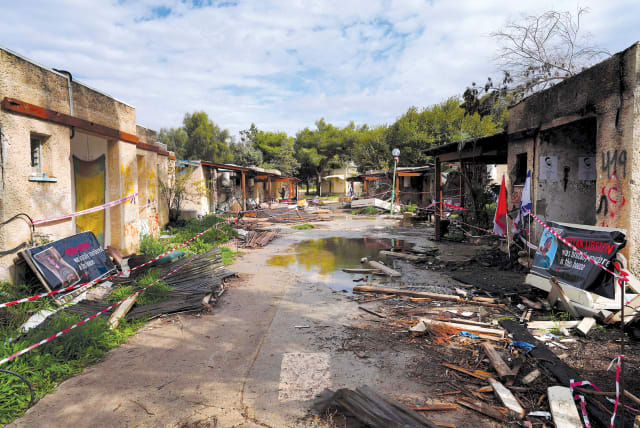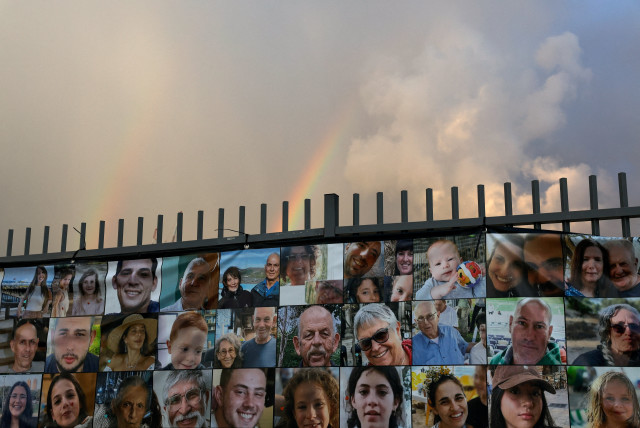Why wasn’t October 7 prevented? Time to look to the West - analysis

Even if it is possible that they didn’t know the exact date of the attack, it’s still reasonable to ask for soul-searching in the West and among Western allies about why Oct. 7 wasn’t prevented.
While Israel will need to investigate its own failures on and leading up to October 7, there is also enough blame to go around Western nations.
Hamas is hosted by Qatar, a major non-NATO ally of the US. Doha is also close to many other Western countries. In addition, Turkey, a member of the North Atlantic Treaty Organization, backs Hamas. As such, two of the West’s closest allies in the Middle East are both closely connected to the terrorist group.
How did Hamas plan the greatest mass murder of Jews in a single day since the Holocaust while also being hosted by Western allies? How is it possible that Western allies hosted and backed Hamas while Western governments knew nothing about the plans for October 7?
These are important questions because October 7 was certainly not in the interests of Israel or Gazans. More than 200,000 Israelis had to be evacuated in its wake, and because of Hezbollah’s supporting rocket fire.
'Ceasefire' calls amid post-Oct. 7 realities
Some 1,200 people were killed in Israel and 253 were taken hostage. Israel’s inevitable response has been massive. Most countries in the region as well as in the West would surely have wanted to avoid this war. Pro-Palestinian activists across the West demand a ceasefire and there are fears of a wider regional war and famine in Gaza.
All of this could have been prevented, and not just by more vigilant Israeli protection of its Gaza border. October 7 could not have possibly been carried out by a handful of terrorists alone. Hamas has never carried out such a complex attack. In fact, it has only recently become powerful enough to conceive of such an attack. Its sophistication points to foreign support and advice.
Reports have shown that Hamas cyber and intelligence capabilities have expanded in recent years. It expanded its rocket arsenal and its ability to fire large barrages of them simultaneously. It expanded its knowledge of Israel’s border fence electronics and sought to use new methods to outsmart artificial intelligence-driven technologies.
In addition to two Western backers, Hamas’s main backer is Iran. After October 7, Russia and China did not condemn the perpetrators and have appeared to excuse its attack. In addition, the Iranian regime sent its foreign minister to Qatar to congratulate the Hamas high command.
The role of Iran
Is it reasonable to conclude that Iran, Russia, China, Turkey and Qatar were quietly backing Hamas before October 7, and that no Western or regional government got wind of its plans?
Even if it is possible that they didn’t know the exact date of the October 7 attack, it’s still reasonable to ask the West and its regional allies why the tragedy wasn’t prevented.
The evidence shows that even after October 7, Western governments applied no pressure on their allies in the region to distance themselves from Hamas. It actually appears the West has encouraged countries such as Qatar to host the terrorist group.
The more Hamas attacks Israel, the more the West’s allies host and back Hamas. Why is this? Why is there a reward for hosting Hamas?
Instead of soul-searching over how October 7 happened, how it could have been prevented and what intelligence signals were missed, most Western governments appear to back both Israel’s response against Hamas and their allies who host it.
Instead of asking “why wasn’t more done to prevent this” and “why didn’t we know” and “why didn’t our allies in the region warn us,” the response appears to be to back both sides. It’s unclear how this serves the interests of either Israel or Gazans.
There seems to be a place for soul-searching in the West. If countries want to stop wars in the world, they should be doing more to prevent them and figure out how such wars can be planned right under their noses.
Media reports have said that Iran was not aware of the October 7 plan. However, Iran and many other countries rushed to back Hamas and did not condemn the attack. In fact, Tehran immediately pressured Hezbollah and the Houthis and militias in Iraq and Syria to join the attack. If Iran had no foreknowledge, then why did it rush to exploit the attack by pushing for more of them?
This leads to another key question about October 7. Many governments in the region have venerable intelligence services. How did none of them know more about October 7? These questions should be posed to Jordan, Egypt and other states.
The goal of intelligence services should be to provide warnings to allies for these kinds of regional disasters. Prior to October 7 the goal of many governments, on paper at least, was regional integration. Regional integration doesn’t work when massive wars, like the one in Gaza, take place.
Therefore it’s worth wondering how it’s possible that none of the countries that were backing regional integration, from the West to the Abraham Accords countries, were able to prevent this massive war. Instead they all appear to have been sleepwalking, no less than Israel, into a trap set by Iran, Russia, China and other countries.
The West’s decision to encourage Qatar’s continued role as host to Hamas from where its political echelon incites, and has shown that it acts, with impunity, suggests that another October 7 is only a matter of time. If the goal is to prevent large wars like the one in Gaza, it’s not clear how the West’s empowerment of Hamas, via its allies, is helping the region.
Jerusalem Post Store
`; document.getElementById("linkPremium").innerHTML = cont; var divWithLink = document.getElementById("premium-link"); if (divWithLink !== null && divWithLink !== 'undefined') { divWithLink.style.border = "solid 1px #cb0f3e"; divWithLink.style.textAlign = "center"; divWithLink.style.marginBottom = "15px"; divWithLink.style.marginTop = "15px"; divWithLink.style.width = "100%"; divWithLink.style.backgroundColor = "#122952"; divWithLink.style.color = "#ffffff"; divWithLink.style.lineHeight = "1.5"; } } (function (v, i) { });

